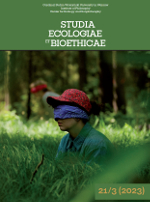Cultural Heritage in the Field of the Idea of Nature Protection in the Second Polish Republic (1918-1939) as an Antecedent of Ecological Education in Poland at the Turn of the 21st Century
Cultural Heritage in the Field of the Idea of Nature Protection in the Second Polish Republic (1918-1939) as an Antecedent of Ecological Education in Poland at the Turn of the 21st Century
Author(s): Edyta WolterSubject(s): Cultural history, Economic history, History of ideas, Human Ecology, Interwar Period (1920 - 1939)
Published by: Wydawnictwo Naukowe Uniwersytetu Kardynała Stefana Wyszyńskiego w Warszawie
Keywords: the heritage of Polish culture;Second Republic of Poland (1918-1939);nature conservation;ecological education;Act of 10 March 1934 on nature conservation;spiritual “fathers” of nature conservation
Summary/Abstract: the heritage of Polish culture, Second Republic of Poland (1918-1939);nature conservation, ecological education;Act of 10 March 1934 on nature conservation;spiritual “fathers” of nature conservation/ecological educationThe aim of the article is to present the heritage of Polish culture on the example of the co-creators of the idea of nature protection, the “spiritual fathers” of ecological education in the Second Polish Republic (1918-1939) who developed normative acts of nature protection, such as the Act of 10 March 1934 on nature protection. They contributed to the establishment of the Temporary Commission for Nature Conservation (1919) / State Council for Nature Conservation (1925), the League for Nature Conservation (1928). They were advocates of nature reserves, national parks, as well as broadly understood education of Polish society aimed at raising ecological awareness (environmental education). The research problem is set in the interpretative paradigm of humanistic, social sciences. Consequently, a qualitative method of research was applied (qualitative text analysis /qualitative analysis of documents), in which hermeneutic understanding and text interpretation is relevant. The source basis includes printed texts and scientific research directly and indirectly connected with the subject issue. Shaping environmental awareness in the process of environmental education in the Second Polish Republic has a timeless value. It is a valuable heritage of national culture and an antecedent of ecological education implemented in the general tendency of postmodern culture, which evokes the ideals of the second half of the 20th century and the beginning of the 21st century.
Journal: Studia Ecologiae et Bioethicae
- Issue Year: 21/2023
- Issue No: 3
- Page Range: 83-91
- Page Count: 9
- Language: English

